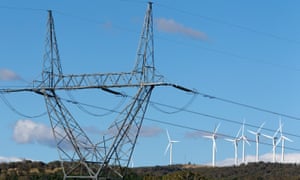The recent record investment in renewable energy is showing signs of slowing dramatically, the Clean Energy Council warns
A new snapshot of Australia’s clean energy sector warns new
investment committed in the first half of 2019 has fallen back to 2016
levels, when Tony Abbott invited an investment strike when he tried to abolish the renewable energy target.
While the Morrison government has been trumpeting record recent investment in renewable energy to rebut persistent arguments the Coalition lacks ambition on climate policy, an assessment of the investment outlook prepared by the Clean Energy Council, to be released on Wednesday, warns the positive trend is in danger of abrupt reversal because of the ongoing lack of policy certainty.
“After a record breaking two years of investment in large-scale wind and solar projects, the pace of projects reaching financial close has slowed dramatically over the past two quarters,” the investment outlook says.
“Quarterly investment commitments in new renewable energy projects
reached a high of over 4500MW in late 2018, but has since collapsed to
less than 800MW in each of the first two quarters of 2019.”While the Morrison government has been trumpeting record recent investment in renewable energy to rebut persistent arguments the Coalition lacks ambition on climate policy, an assessment of the investment outlook prepared by the Clean Energy Council, to be released on Wednesday, warns the positive trend is in danger of abrupt reversal because of the ongoing lack of policy certainty.
“After a record breaking two years of investment in large-scale wind and solar projects, the pace of projects reaching financial close has slowed dramatically over the past two quarters,” the investment outlook says.
The report says the large-scale RET, which winds down after 2020, led to 15,700MW of new capacity being financially committed over the past two years, with that generation either under construction or recently commissioned.
“But with the absence of policy certainty beyond the 2020 RET and a range of regulatory barriers to overcome, investment commitments in new generation have fallen dramatically this year.”
It notes that with the rate of new investment now slowing, the forward outlook for wholesale energy prices has begun to rise again. “A sustained slow-down in the level of new large-scale generation will have a dramatic impact on Australia’s energy prices and reliability, as well as the ability to achieve future emissions reduction targets.”
Executives from the renewable energy sector will converge on Canberra on Wednesday for their annual chief executives forum and parliamentary reception.
The group will hear from the energy minister, Angus Taylor, the shadow minister, Mark Butler, and the Greens leader, Richard Di Natale, as well as the head of the Australian Energy Market Operator, Audrey Zibelman, who recently used Aemo’s latest 10-year forecast of reliability in Australia’s power supply to highlight the urgent need for more investment in dispatchable energy and in transmission infrastructure.
That Aemo forecast warned Australia’s ageing thermal generators are increasingly unreliable.
Energy policy in Australia has been in a state of profound uncertainty since the dumping of the national energy guarantee (Neg) last August, when conservatives moved against then prime minister Malcolm Turnbull.
The renewable energy sector supports reviving the Neg, as do the Liberal governments in New South Wales and South Australia. If the Neg cannot be revived, the industry is calling on the Morrison government to extend the RET beyond 2020, implement a clean energy target, or revisit carbon pricing.
The new investment outlook produced for the Clean Energy Council is cool on a Morrison government proposal to underwrite investment in new power generation. It says the “program has the potential to support a wave of new projects, but a higher level of transparency is needed in relation to the selection of projects to minimise the impact on market confidence”.
Kane Thornton, the chief executive of the Clean Energy Council, said: “With Australia’s coal-fired power stations ageing rapidly, it is essential new clean energy projects are built now to ensure lower power prices and improved reliability when these old clunkers retire from service.”

No comments:
Post a Comment